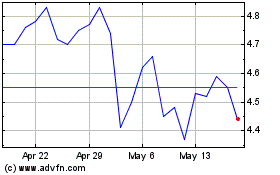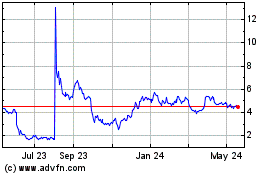Next step in registration-directed PALISADE
Phase 3 program for fasedienol in social anxiety disorder achieved
as planned
Vistagen (Nasdaq: VTGN) a late clinical-stage
neuroscience-focused biopharmaceutical company dedicated to the
development and commercialization of groundbreaking therapies for
psychiatric and neurological disorders based on nose-to-brain
neurocircuitry, today announced enrollment of the first subject in
its PALISADE-4 Phase 3 trial of fasedienol, an investigational
neuroactive pherine nasal spray in U.S. registration-directed Phase
3 development for the acute treatment of social anxiety disorder
(SAD).
“With the initiation of PALISADE-4 as planned, we have achieved
another important milestone in our registration-directed PALISADE
Phase 3 program for fasedienol, which has potential to deliver a
transformative acute treatment option to over 30 million Americans
suffering from the debilitating effects of SAD, including increased
risk for depression, alcohol abuse, and suicide attempts,” said
Shawn Singh, Chief Executive Officer of Vistagen. “Current
pharmacological therapies approved by the U.S. FDA do not include
an acute treatment option. With pioneering neuroscience, we are
breaking new ground in the development of a treatment for SAD with
our novel product candidate designed for non-systemic, rapid
activation of nose-to-brain neural circuits to reduce fear and
anxiety associated with SAD.”
About Vistagen’s PALISADE Phase 3 Program for Fasedienol
for the Acute Treatment of SAD
Vistagen's U.S. registration-directed PALISADE Phase 3
development program for fasedienol for the acute treatment of SAD
includes the ongoing PALISADE-3 and PALISADE-4 Phase 3 trials, each
a randomized, double-blind, placebo-controlled Phase 3 trial
designed to evaluate the efficacy, safety, and tolerability of the
acute administration of fasedienol to relieve anxiety symptoms in
subjects with SAD induced by a public speaking challenge conducted
in a clinical setting. PALISADE-3 and PALISADE-4 are designed
similarly to Vistagen’s PALISADE-2 Phase 3 trial of fasedienol,
from which positive data was reported last year. The primary
outcome measure in each of the PALISADE Phase 3 trials is a
subject’s self-rated Subjective Units of Distress Scale (SUDS).
Similar to PALISADE-3 initiated earlier this year, the PALISADE-4
Phase 3 U.S. multi-center trial is planned to randomize
approximately 236 adults aged 18 through 65. Subjects will be
randomized in a 1:1 ratio to fasedienol or placebo. PALISADE-3 and
PALISADE-4 also include open-label extension phases to evaluate the
safety and tolerability of ongoing use of fasedienol in a
real-world setting over a period of up to 12 months. Vistagen
believes either PALISADE-3 or PALISADE-4, if successful, together
with PALISADE-2, may establish substantial evidence of the
effectiveness of fasedienol in support of a potential fasedienol
New Drug Application (NDA) submission to the FDA for the acute
treatment of SAD.
About Fasedienol Nasal Spray
Fasedienol is a potential first-in-class, investigational
neuroactive pherine nasal spray designed to have rapid onset with a
novel proposed mechanism of action (MOA) that is differentiated
from all currently approved anxiety medications. Fasedienol is
designed to regulate the olfactory-amygdala neural circuits of fear
and anxiety and attenuate the tone of the sympathetic autonomic
nervous system, without systemic absorption, potentiation of GABA-A
receptors, or direct activity on neurons in the brain. Vistagen’s
U.S. registration-directed PALISADE Phase 3 program for fasedienol
is focused on the acute treatment of SAD. Fasedienol has not
demonstrated any signals of abuse potential or suggested any
potential for psychological and physical dependence in any clinical
trial conducted to date. There is no U.S. FDA-approved acute
treatment for SAD. The U.S. FDA has granted Fast Track designation
for the investigation of fasedienol for the acute treatment of
SAD.
About Social Anxiety Disorder
Social anxiety disorder (SAD) affects over 30 million Americans.
A person with SAD feels intense, persistent, and sometimes
disabling symptoms of anxiety or fear in certain social situations,
such as meeting new people, making comments in a business meeting,
dating, being on a job interview, answering a question in class, or
talking to a cashier in a store. Doing common, everyday things in
front of people causes profound anxiety or fear of being
embarrassed, evaluated, humiliated, judged, or rejected. SAD can
get in the way of going to work, attending school, or doing a wide
variety of things in a situation likely to involve interpersonal
interaction. It can lead to avoidance and opportunity costs that
can significantly impact a person's employment and social
activities and can be very disruptive to their overall quality of
life. There is no U.S. FDA-approved acute treatment for SAD.
About Vistagen
Headquartered in South San Francisco, CA, Vistagen (Nasdaq:
VTGN) is a late clinical-stage neuroscience-focused
biopharmaceutical company dedicated to the development and
commercialization of groundbreaking therapies for psychiatric and
neurological disorders based on its pioneering approach and deep
understanding of nose-to-brain neurocircuitry. Vistagen’s
diversified pipeline of pherine product candidates is designed
exclusively as nasal sprays administered at microgram level doses
to rapidly activate chemosensory neurons in the nasal cavity with
novel non-systemic proposed mechanisms of action designed to impact
the olfactory system and brain neurocircuitry to achieve diverse
therapeutic effects. Favorable safety data have been generated in
all clinical studies of Vistagen’s pherine product candidates
completed to date. Vistagen’s neuroscience pipeline also includes
an oral prodrug with the potential to modulate NMDA receptor
activity in certain neurological conditions, such as
levodopa-induced dyskinesia associated with Parkinson’s disease
therapy and neuropathic pain. At Vistagen, we are passionate about
creating novel and differentiated treatments that set new standards
of care for millions of people living with anxiety, depression, and
other neurological disorders. Connect at www.Vistagen.com.
Forward-looking Statements
This press release contains certain forward-looking statements
within the meaning of the federal securities laws. These
forward-looking statements involve known and unknown risks that are
difficult to predict and include all matters that are not
historical facts. In some cases, you can identify forward-looking
statements by the use of words such as “may,” “could,” “expect,”
“project,” “outlook,” “strategy,” “intend,” “plan,” “seek,”
“anticipate,” “believe,” “estimate,” “predict,” “potential,”
“strive,” “goal,” “continue,” “likely,” “will,” “would” and
variations of these terms and similar expressions, or the negative
of these terms or similar expressions. Such forward-looking
statements are necessarily based upon estimates and assumptions
that, while considered reasonable by Vistagen and its management,
are inherently uncertain. As with all pharmaceutical products,
there are substantial risks and uncertainties in the process of
development and commercialization and actual results or
developments may differ materially from those projected or implied
in these forward-looking statements. Among other things, there can
be no guarantee that any of Vistagen’s drug candidates will
successfully complete ongoing or future clinical trials, receive
regulatory approval or be commercially successful, or that Vistagen
will be able to successfully replicate the result of past studies
of its product candidates, including fasedienol, itruvone, PH80 or
its other drug candidates. Other factors that may cause such a
difference include, without limitation, risks and uncertainties
relating to conducting and/or completing ongoing clinical trials,
including PALISADE-3 and/or PALISADE-4; launching planned clinical
trials for any of our product candidates, including fasedienol;
Vistagen’s submission of a new drug application (NDA) to the U.S.
FDA for any product candidate, including fasedienol; the ability of
any clinical trial information submitted by the Company to the U.S.
FDA to support a NDA; the scope and enforceability of Vistagen’s
patents, including patents related to Vistagen’s pherine drug
candidates and AV-101; fluctuating costs of materials and other
resources and services required to conduct Vistagen’s ongoing
and/or planned clinical and non-clinical trials; market conditions;
the impact of general economic, industry or political conditions in
the United States or internationally; and other technical and
unexpected hurdles in the development, manufacture and
commercialization of Vistagen’s product candidates. These risks are
more fully discussed in the section entitled “Risk Factors” in
Vistagen’s most recent Annual Report on Form 10-K for the fiscal
year ended March 31, 2024, and Quarterly Report on Form 10-Q for
the period ended June 30, 2024, as well as discussions of potential
risks, uncertainties, and other important factors in our other
filings with the U.S. Securities and Exchange Commission (SEC).
Vistagen’s SEC filings are available on the SEC’s website at
www.sec.gov. You should not place undue reliance on these
forward-looking statements, which apply only as of the date of this
press release and should not be relied upon as representing
Vistagen’s views as of any subsequent date. Vistagen explicitly
disclaims any obligation to update any forward-looking statements
other than as may be required by law. If Vistagen does update one
or more forward-looking statements, no inference should be made
that Vistagen will make additional updates with respect to those or
other forward-looking statements.
View source
version on businesswire.com: https://www.businesswire.com/news/home/20240923438804/en/
Investors: Mark McPartland markmcp@vistagen.com Media: Caren
Scannell cscannell@vistagen.com
Vistagen Therapeutics (NASDAQ:VTGN)
Historical Stock Chart
From Dec 2024 to Jan 2025

Vistagen Therapeutics (NASDAQ:VTGN)
Historical Stock Chart
From Jan 2024 to Jan 2025
